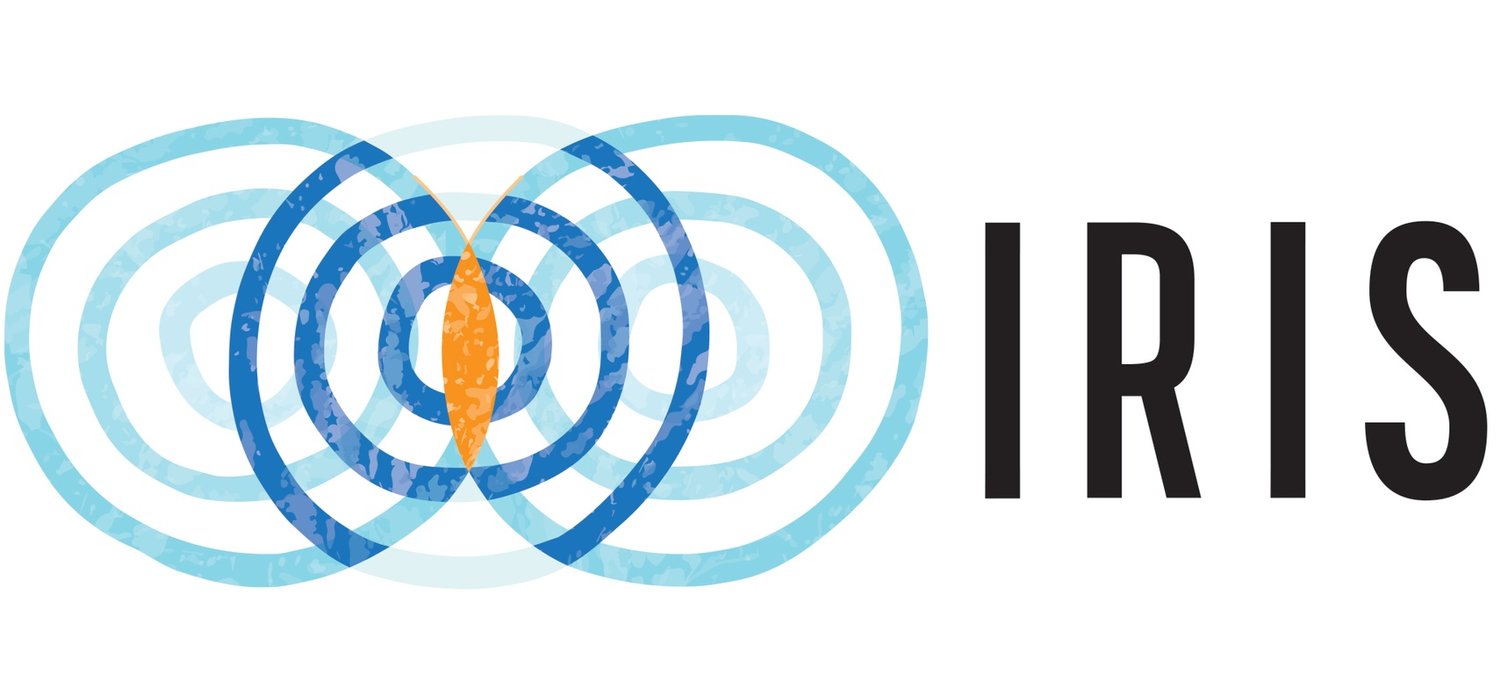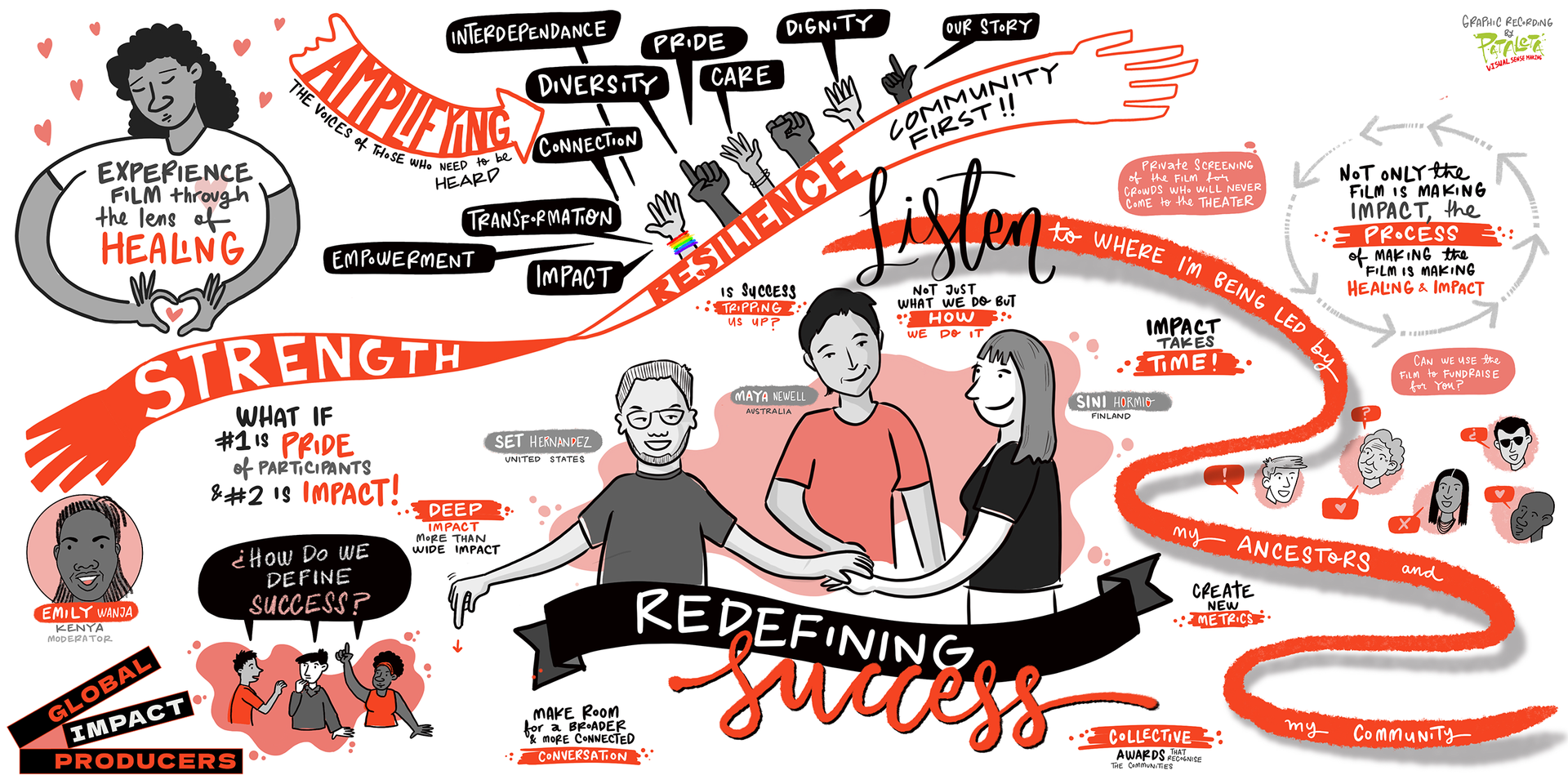A Safe Space to Share Everything: Redefining Success and Celebrating Interdependence
By
GIPA Co-coordinator Michelle Plascencia
Edited by Mia Deschamps, IRIS
Maybe what I'm trying to say is that maybe I'm not thinking about the word success when I make a film to begin with. Maybe what I'm trying to say is: How do we allow the life cycle of the process, the film, to guide us to a certain destination that maybe we never even anticipated.
- Set Hernandez, filmmaker
In May 2023, Global Impact Producers Alliance (GIPA) hosted a two-day, two-timezone Virtual Assembly for the community of impact practitioners to connect, learn, grow and more than anything: create a Safe Space to Share Everything. The theme originates from our observations of the current climate for independent storytelling (fraught) and the risks and resistance that documentary filmmakers are confronting from big media outlets, streamers, platforms. So: a compromised independent storytelling ecosystem. Heavily curated forms of storytelling also restrict the potential of an impact campaign for a film.
And this is where GIPA steps in.
The Global Impact Producers Alliance—GIPA’s—role within this reality is to hold space for our community-led network of impact practitioners, strategically elevating the power of documentaries through programs and platforms to connect with one-another, aiming to share all our resources, experience, and knowledge around impact campaigns.
The GIPA team and advisory committee at FIFDH Impact Days 2023 in Geneva. GIPA hosted a conversation about the community and highlighted the film and impact field around the globe.
GIPA is a space to unite, connect, amplify and celebrate the power of documentary film through strategic planning of an impact campaign, and we are also proud that this community has brought together some brilliant, creative minds that have gotten films where they need to be, inside and outside of traditional distribution routes, festivals and even streaming platforms.
During the Share Everything event, GIPA comrade Maya Newell describes a regular distribution campaign—the publicity we’re all used to for a film—as being about “profit, eyeballs, profile; then maybe some impact at the bottom if you're lucky.” Which, for Maya and for all of us, begs the question: how do we turn distribution campaign priorities upside down? Maya’s proposal for righted campaign priorities?
Number one is the pride of the participants in our film. Number two is the impact that we can create on whatever scale of campaign we're running. Then it’s eyeballs and then it's awards.
Maya isn’t just daydreaming: she’s seen models work this way and taken part personally in co-designing impact strategies with those featured in the documentaries. These “upside-down” models—which prioritize social impact over profit—have worked, powered by strategic, collaborative efforts between filmmakers, featured communities, and impact campaigners as they imagine, design and eventually distribute a film through an impact campaign.
We know that impact campaigns can help films reach a higher number of viewers among audiences the film was intended for but these films might still be less likely to enjoy, for example, a film festival red carpet premiere. Why is it an upstream battle to celebrate social issue films equally on a red carpet? Or maybe the real question is: do we need red carpets anymore? Set Hernandez, GIPA comrade, impact practitioner guru and filmmaker, tells us, “Maybe I'm not thinking about the word success when I make a film to begin with. Maybe what I'm trying to say is that: How do we allow the life cycle of the process, the film, to guide us to a certain destination that maybe we never even anticipated.”
Impact producing walks a fine line between storytelling and activism and often gets shoved to the back burner. Benefitting from the powerful unity of the GIPA community and impact practitioners around the globe, we know ourselves to be a rare breed of film lovers. Impact practitioners—with intentional, deliberate, and even spiritual devotion—push films forward against all odds, driven to reverse a general lack of visibility of social-issue, community-focused films.
During our May assembly, Set reminded us:
GIPA Coordinator Michelle Plascencia with fellow organizers of the 2nd Latin American film and social impact forum in Mexico City in June 2023.
Left to Right: Itzel Martínez del Cañizo, Merle Iliná, Michelle Plascencia, Carol Misorelli, Marcela Lizcano, Tatiana Vila, Lívia Almendary, Vanessa Cuervo Forero.
How do we avoid comparing ourselves with each other? How do we, instead, lean on each other, you know? How do we remind each other that each of our work, each of our journeys is the way it's supposed to be, and we can learn a lot from each other? Maybe that spirit. Instead of making a new award or something else, how do we avoid that competition, and instead, be interdependent on each other as a community?”
When we first considered hosting a panel called Redefining Success, we grappled with what success means. Why would a space to discuss redefining it—to question ourselves and dig deep—matter? Instead of award wins, fancy festival premieres, and big streaming deals, what other milestones might be the right ones if we were to completely redefine and reimagine “successful” films?
Emily Wanja, as she wrapped up the panel, brought these questions of impact and success into a broader perspective with a quote from Kumi Naidoo, Former Secretary General of Amnesty International:
When you look at potential shifts, like the desperate need to democratise the world’s governments, the work takes much, much longer. Great perseverance is needed. So the culture of thinking that good environmental or social intervention can happen in short cycles and the current obsession with wanting organisations to prove they are having an immediate impact, is misleading.
And, she continued,
Even thinking about defining these other ways of success or the influence that this work is having on culture, the value of that engagement: it takes longer.
Emily refers to the immediate reactions, to a screening, for example. But she presses us all to think bigger and further about success: what happens after, long after, people watch a film? What kind of behavior and mind changes could happen, some we might know nothing about.
We, impact producers, celebrate these stories of success alongside communities, not around or above them. We are distributors of important social issue films. We innovate, invent, mold, adapt and codesign to the possibilities because we know that, for the film to get where it can, it relies on our collective work. Sometimes, we struggle with knowing our direction or swimming against the tide. Impact practitioner and GIPA ally, Sini Hormio shone a light on the uncertainty that sometimes goes along with our work:
We have the power to change [metrics], and we might not have all the solutions yet, but we can. And it comes down to that, at the end of the day, all the work I've done, maybe I don't think none of them were a failure, because I’ve tried and somebody learned something, and there was always somebody even if it was a smaller group that was really really touched by it. So all work is good work.
GIPA is a place of union and camaraderie. We celebrate the interdependence of our network and the power of good documentary storytelling. We were so grateful to bring Set, Maya, Sini and Wanja together, across four continents enlightening us with their knowledge and experience—and inspiring us by sharing their questions and vulnerabilities—to remind us that what we aim for is
never this or that, sometimes it's a mixture of all the things.
—Grace Lee Boggs
Graphic summary of the GIPA Redefining Success panel by Pataleta





